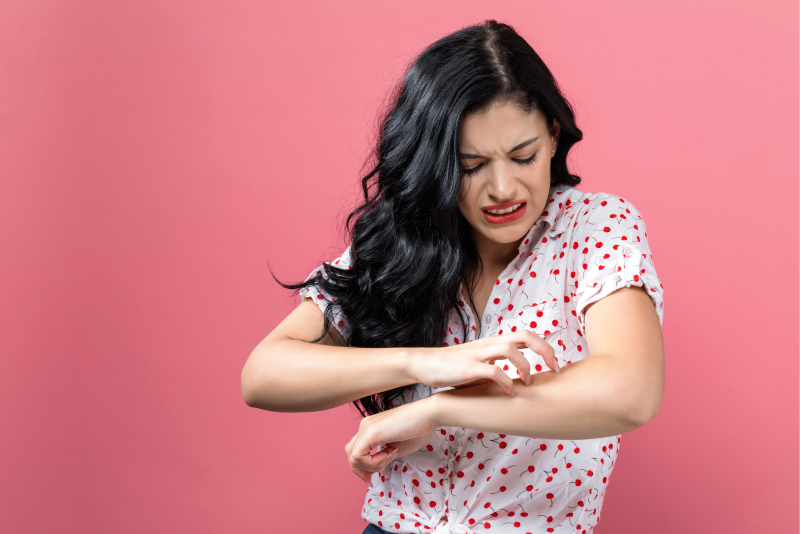
Skin picking goes beyond a bad habit. It can be a painful, embarrassing, and even debilitating condition. If you have ADHD, you might find there’s a deeper connection than you realised.
We often hear that skin picking is just a habit, something you can easily stop if you try hard enough. But for those of us who struggle with it - and I struggle constantly with it - we know it’s much more complex. It’s time to challenge these misconceptions and explore the possibility that skin picking could be related to ADHD.
What is it?
Have you struggled with skin picking? You wouldn't be alone. Many of us experience the urge to pick at our skin. This isn't just a bad habit; it's a condition called excoriation disorder, or sometimes it's called skin picking disorder or dermatillomania.
Excoriation disorder is a mental health condition characterised by the repeated urge to pick at your skin. This can lead to cuts, scabs, infections, and scarring. It's common to feel distress and frustration because of the constant battle to resist the urge.
It's important to understand that skin picking isn't a sign of weakness or lack of willpower. It's a complex issue that can be influenced by several factors, including ADHD. While skin picking can occur independently, it often co-exists with other mental health conditions.
ADHD and Skin Picking: A Closer Look
Inattention, difficulty focusing, and emotional regulation challenges are commonly seen with ADHD. These characteristics can contribute significantly to skin picking behaviours.
Impulsivity, a core part of ADHD, plays a direct role. The urge to pick at your skin can feel overwhelming, and it might be hard to resist the immediate relief it provides. This cycle can be tough to break.
Inattention can also contribute to skin picking. Difficulty concentrating, when your mind wanders or you struggle to focus, picking can become a way to distract yourself. The repetitive action can provide a temporary sense of calm, even though it's harmful in the long run.

A study of 262 adults in 2022 found that:
- Where the people involved in the study had skin picking combined with another disorder, in 8% of cases that disorder was ADHD. Skin picking was highly linked with General Anxiety Disorder (21.8%) and Trichotillomania (24.4%). Typically skin picking begins before age 20 and predominantly affects women. The most common area to pick is the face, but it's not unusual for there to be more areas involved. Stress and the feel of the skin are common triggers. The majority of sufferers have not received treatment, but those who did found it helpful.
We with ADHD often exhibit a seek immediate rewards. We are not good at waiting for gratification! This is linked to the brain's reward system and the way ADHD affects the functioning of our brain.
- Dopamine: This neurotransmitter plays a key role role in motivation and reward. Women with ADHD may experience lower levels of dopamine, making us seek out stimulating activities or immediate rewards to increase our dopamine levels.
- Prefrontal Cortex:This area of the brain, responsible for planning, decision-making, and impulse control may not function optimally in those of with ADHD, making it difficult to consider long-term consequences of skin picking.
The Emotional Price of Skin Picking
Skin picking can do more than just damage your skin. It can also hurt your self-esteem and how you feel about yourself.
Feeling ashamed of your skin can make you want to hide away and avoid spending time with others. This can lead to loneliness and sadness.
The constant cycle of picking and healing can be really frustrating and make you feel helpless. It can also get in the way of work, school, friendships, and enjoying the things you love.
It's important to remember that you're not alone; there's help available.

Finding help.
Talking to a mental health professional can be a big step forward. There is advice, here, on the NHS website - which is a good place to start.
There are different types of therapy that can be effective in addressing skin picking including (CBT) Cognitive Behavioural Therapy (it focuses on identifying triggers, challenging negative thoughts, and developing coping mechanisms) and Dialectical behaviour therapy (DBT).
In some cases, medication might be helpful as part of a treatment plan. It's essential to discuss this with a healthcare professional to determine what's best for you. Stimulants commonly prescribed for ADHD can help improve focus and reduce impulsivity, which may indirectly benefit skin picking.
Skin picking can be a tough issue to deal with. It's more than just a bad habit – it's a complex condition that can cause a lot of distress and impact your daily life.
It's important to remember that you're not alone. Many others face the same challenges. There’s no shame in seeking help,and there are treatments available that can make a real difference.
If you think skin picking might be affecting you, please reach out for support. A mental health professional can provide guidance and create a plan to help you manage it.
Add comment
Comments